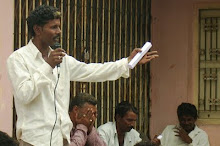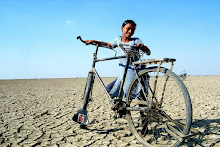Background:
‘Salt’, one of the vital ingredient of our daily meal, is produced by ‘Agariyas’ inside little Rann of Kutch, of Gujarat. ‘Agariya’- a term derived for community working in “Agar” meaning ‘salt-pan’ is a an occupation identity of more than 45000 people belonging to chunvaliya koli, Ahir, Miyana, and Sandhi community, majority falls in “De-notified Tribe Category”. ‘Agariya‘produce salt using sub-soil brine from little Rann of Kutch (LRK), live in adverse condition and work in extreme temperatures. They are left vulnerable due remoteness, adverse geographical conditions, poverty and very limited access to basic services like education, health, water, road, electricity etc, which are accessible to citizen living in a village.
‘Health’ is one among the crucial issues for Agariyas in Gujarat. There are severe health issues of which is related to occupation - ‘salt making’, like skin infection due non availability of enough water, cuts and infections in the legs due to crystals in the pan, eye diseases due to glare from the salt pan, urinary track infection due to less intake of water, gynecological problems due lack of sanitation facility, nutrition related problems due to lack of vitamins, proteins, calcium, minerals, iron in daily intake etc. Though in last few years, mobile health Vans have started reaching to their work areas, inside little Rann of Kutch, there are many other factors like distance, shortage of human resources, lack of adequate medicines and other facilities which leads to severe health issues for Agariyas, especially for women and children
AHRM in last four years of its active intervention in 7 major salt producing districts of the state, has focused on enhancing and the reach of government services to remote Rann areas and its accountability towards communities, its regularity, developing community monitoring- participation, awareness amongst communities etc.
AHRM is also involved in the programmes implemented by Salt Department, GOI for co-ordination and community mobilization. Based on the field experience and consultations with community and other stakeholders, it is required to have focused intervention in health for targeted groups like women & children. In forthcoming days, AHRM will try to address this need.
As part of this, a health camp was organized at Santalpur, community health center. Mrs. Urmiben Desai and Prof. Ashwin Karia, concerned citizen from Ahmedabad, have mobilized funds from their friends circle and showed their willingness to support this health camp.
Community health Center CHC and Salt Commissionerate regional office also joined the camp as co-organizer offering their infrastructure and also partial support for medicine. The other medicines were made available at very low cost by Dr. Rita Shah, pediatrician from Ahmedabad.
Dr. Virenbhai Doshi, one of most concerned person and AHRM associate requested his friends from Bhansali Trust, Dr. Jawahar(General Physician), Dr. Akashdip Parmar (Gynecologist) and Dr. Lalji Patel (skin specialist) for giving their expertise.
Dr. Kundan, Chief medical officer CHC Santalpur, also joined with us along with entire CHC staff.
Mrs Urmiben Desai, and AHRM team as well as community leaders including AHRS karobari Samiti members joined actively in logistic arrangement.
Around 135 patient attended the health camp around 30 percent of them were women.
50 patients of fever and complaints of body ache, while 20 women had Gynecological related complaints, more than 35 had skin infections and 25 had multiple complaints of skin, fever, cold-cough and body ache and skin infections.
Two severe cases, Jayashri Ahir (26 days) and daughter of Habib Raja (4 months) of Septicimea were identified, which were referred to secondary level treatment at Disa.
A baby girl was born during the health camp to Riyaben Ahir from Garamadi village of Santalpur. It was normal delivery and baby weighed 2.5 Kg.
Doctors View:
Amongst anti-natal cases, all were identified anemic. Skin diseases, scabies, viral infection and eye infection were most common complaints. Doctors suggested that focused health intervention such as awareness campaign, general check up camps then referred to specialists should be done to improve this condition.
AHRM :
AHRM in association with AV-CODE has planned to have health awareness programme for Agariya women. The first phase of the programme is to identify women, who will be trained as community health workers in coming days. TOT and general training and awareness programmes will also held. IREC material will be developed for the same. During second phase such trained community health workers will be linked with mobile health services for Agariyas.
Wednesday, August 12, 2009
THE HEALTH CAMP ORGANISED AT SANTALPUR
Subscribe to:
Post Comments (Atom)
















.jpg)
.jpg)
.jpg)
.jpg)













No comments:
Post a Comment